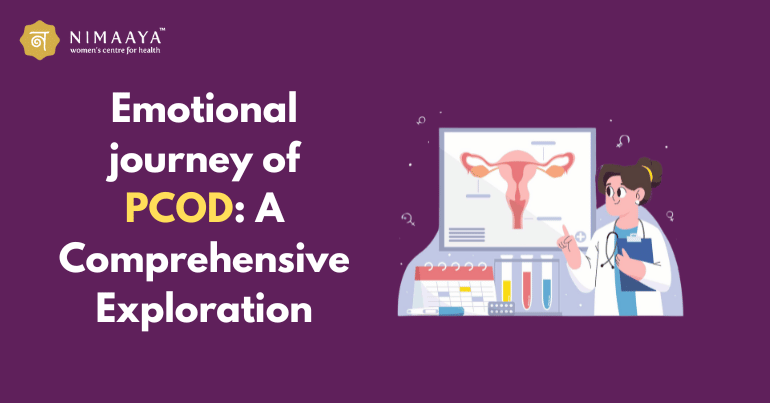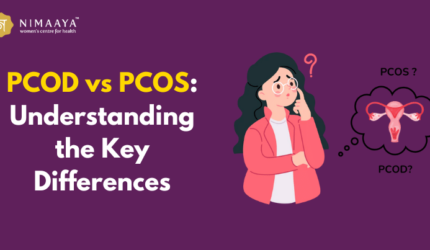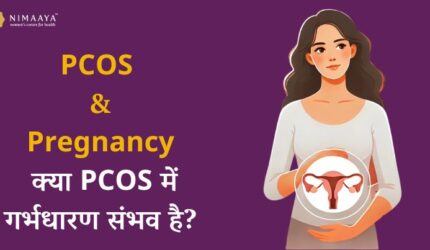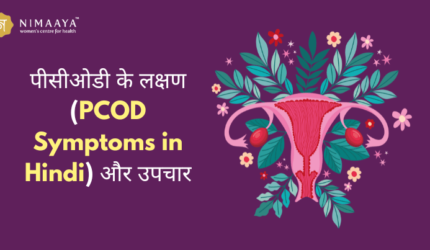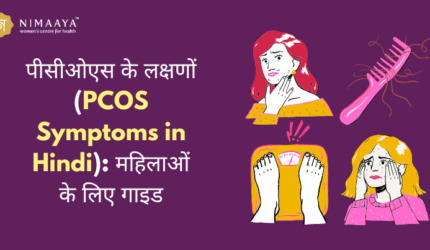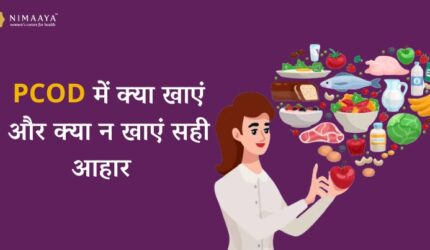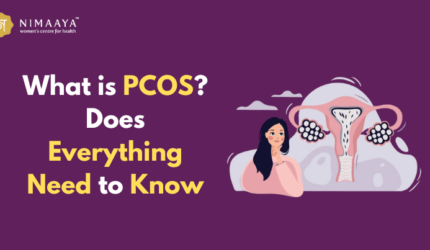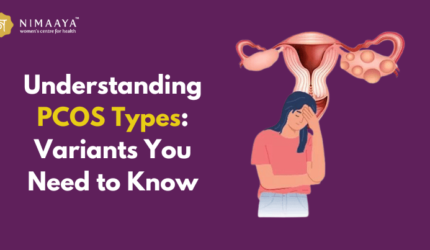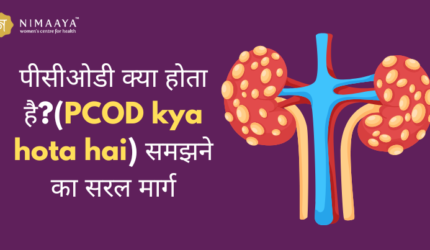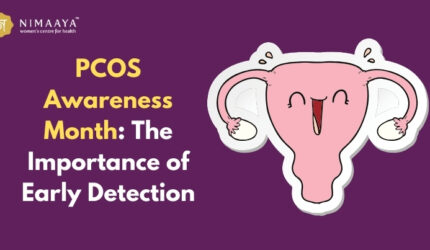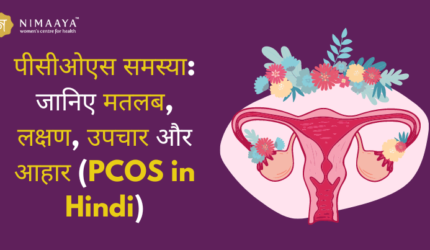PCOD or PCOS has become a common issue among teenagers and adults. This problem is now openly discussed in various communities where women communicate and share their experiences of PCOD problems after marriage, symptoms and complications they face during this journey.
In this blog, we will study all about PCOD, covering its diagnosis, causes, complications and symptoms.
The aim is not only to educate you about what PCOD is but also to help you take preventive measures and deal with a healthier lifestyle.
Let’s get started!
What is PCOD?
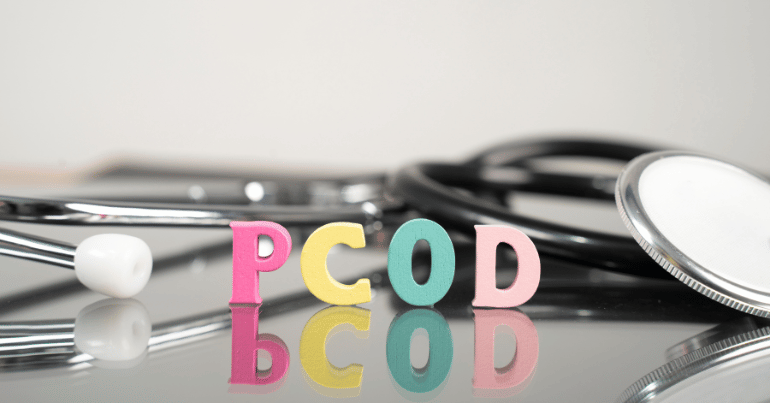
PCOD, or polycystic ovarian disease, is a female reproductive issue that affects the ovaries in women, leading to the formation of cysts. This condition results from hormonal imbalance, causing complications in menstruation, fertility and other issues. Women with polycystic ovarian disease often experience irregular periods and elevated levels of the male hormone androgen. The ovaries may produce small fluid-filled collections but fail to release eggs on a regular basis. Implementing a PCOD diet chart can be crucial in managing symptoms and promoting hormonal balance. Implementing a PCOD diet chart can be crucial in managing symptoms and promoting hormonal balance.
If PCOD is not dealt with in time, it can lead to various serious problems, including heart disease and diabetes.
Polycystic Ovarian Disease Diagnosis
The diagnosis of PCOD involves several stages, including clinical symptoms, physical examination and specific criteria. Let’s explore polycystic ovarian disease diagnosis one by one:
• Physical Examination
At Nimaaya, we conduct a thorough physical examination to assess signs and symptoms associated with PCOD. This may include checking for excess hair growth, acne and signs of insulin resistance, such as dark patches on the skin.
• Medical History
There is a crucial need to gather information on the medical history of an individual. The healthcare may ask about changes in weight, menstrual cycles, changes in weight, symptoms like irregular periods, acne and other relevant information. Additionally, the family history of hormonal disorders also needs to be considered.
• Blood Tests
They are conducted to measure various hormone levels. Certain tests include:
• Hormone Levels
Testing levels of hormones such as LH and FSH, testosterone and insulin.
• Glucose and Insulin Level
You need to assess insulin resistance, which is often associated with glucose and insulin levels.
• Pelvic Ultrasound
A pelvic ultrasound is a diagnosis of PCOD. It will help you visualize the ovaries and the presence of cysts. In PCOD, ovaries may appear enlarged and have small, fluid-filled sacs or follicles, giving them a characteristic appearance described as polycystic.
PCOD Causes
In case of PCOD, small sacs fill up with fluid inside the ovaries. Each of these contains an immature egg that will never trigger ovulation. The absence of ovulation leads to a hormonal imbalance with a high release of male hormones. Let’s explore certain reasons behind it:
① Genetic Factors
There is a scientific study that proves that PCOS has a hereditary component. If a woman has a family history of PCOS, then chances of passing it to the next generation is relatively higher.
② Excess Production of Insulin
The production of insulin is done through pancreas which helps to transfer the food into sugar. Many individuals with PCOD have insulin resistance. This concludes how body cells do not respond effectively to insulin, leading to higher levels of insulin in the bloodstream.
The body compensates for insulin resistance by producing more insulin. The elevated insulin levels can stimulate the ovaries to produce more male hormones that will contribute to the hormonal imbalances in PCOD.
③ Lifestyle
The factors that contribute to PCOD are unhealthy eating habits, lack of nutrition, physical activity causes metabolic imbalance. This may also lead to weight gain and insulin resistance which are associated with PCOD.
④ Stress and Depression
Stress and depression affects your lifestyle mentally and physically. Chronic stress may affect the functioning of the pituitary glands, which will play a crucial role in regulating menstrual cycle.
It will also affect the balance of LH and FSH which are essential for normal ovarian function.
⑤ Low Grade Inflammation
Women who usually suffer from PCOD have low-grade inflammation. The inflammation may affect ovarian function and disrupt the normal maturation of eggs within the ovaries. This will contribute to the formation of ovarian cysts and irregular menstrual characteristics of PCOD.
PCOD Symptoms
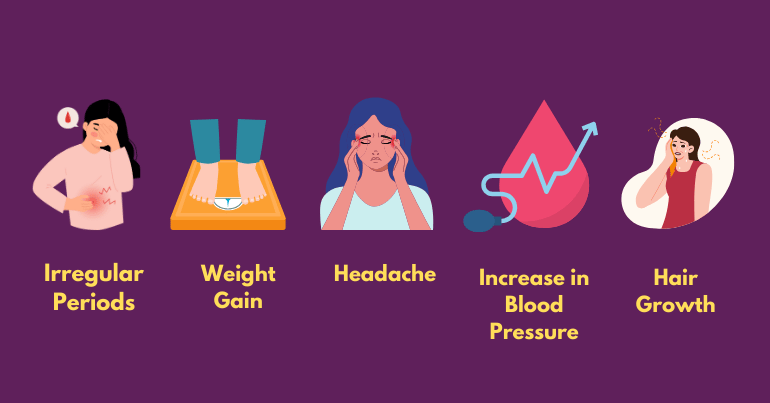
There are multiple symptoms of PCOD problems in females. Let’s explore a few PCOD symptoms:
‣ Irregular Periods
One of the symptoms of PCOD is irregular periods. Women with polycystic ovarian disease may experience infrequent periods, prolonged gaps between periods or unpredictable bleeding.
‣ Weight Gain
Many individuals with PCOS have insulin resistance, meaning cells do not respond effectively to insulin. This results in elevated insulin levels, leading to an increase in the storage of fats, particularly around the abdomen.
Imbalances in reproductive hormones, such as increased levels of male hormones, contribute to weight gain, especially in the abdominal area.
‣ Headache
One of the PCOD problems is hormonal imbalance or fluctuations in estrogen or progesterone, which may contribute to headache in some individuals with PCOS. The chronic stress plays a crucial role as it can be a trigger for headache in some individuals.
‣ Increase in Blood Pressure
Women with polycystic ovarian disease often have insulin resistance, where body cells don’t respond effectively to insulin. This resistance can contribute to an increase in blood pressure.
High PCOS is associated with an increased risk of a condition, including high blood pressure, high blood sugar and abnormal cholesterol levels.
‣ Excessive Hair Growth
Hormonal imbalance includes elevated levels of male hormones such as testosterone. This leads to hirsutism, characterized by excessive growth of body hair in areas where men typically grow hair. Additionally, androgen stimulates hair follicles in individuals with PCOS, leading to increased and thicker hair growth on the face, chest and back.
Complications due to PCOD
Every woman going through PCOD/PCOS is well aware of how higher-than-normal androgen levels can affect their health. Multiple complications occur in the journey, requiring medical attention.
Ⓐ Premature Birth
Women with polycystic ovarian disease are usually more prone to the risk of complications during pregnancy, including a high risk of premature birth. Contributing factors may include insulin resistance, hormonal imbalances or inflammation.
Also Read: What is PCOS? Does Everything Need to Know
Ⓑ Infertility
One of the primary challenges during PCOD is irregular ovulation, making it more difficult to conceive because a consistent release of eggs is essential for fertilization. Secondly, imbalances in reproductive hormones elevate the male hormone and create hurdles in the functioning of the ovaries or menstrual cycle.
Ⓒ Miscarriage
Compared to other cases, PCOD has been noticed with a higher number of miscarriage. The possible factors include hormonal imbalance, insulin resistance and other metabolic issues.
What measures that can be taken to prevent this is early and comprehensive parental care, where you monitor and manage potential complications that could lead to a higher risk of miscarriage.
Ⓓ Depression
There are also chances that imbalances of hormones can affect neurotransmitters in the brain that can potentially contribute to mood disorders such as depression. The chronic nature of polycystic ovarian disease and its associated symptoms such as irregular periods, acne can lead to emotional distress and negatively impact mental health over time.
Ⓔ Abnormal Uterine Bleeding
Irregular ovulation in PCOD can result in abnormal uterine bleeding. This might result in menstrual bleeding or irregular periods that contribute to fertility challenges for individuals with polycystic ovarian disease. The ovulatory dysfunction in PCOS can lead to changes in the endometrial lining of the uterus. Without regular shedding during a menstrual cycle, there are chances that endometrium may become thickened, potentially increasing the risk of abnormal bleeding.
PCOD Treatment Options
There are multiple options available to treat polycystic ovarian disease, but keep in mind that they aren’t PCOD problem treatment permanently, but rather temporary measures that could help you deal with PCOD:
Lifestyle changes for managing polycystic ovarian disease
① Healthy Diet
Adopting a PCOD diet and nutrition is crucial. There are certain things that you should eliminate from your diet such as sugar, oily and fatty food. Try to include fruits, vegetables, whole grains and protein.This will not only help you lower your cholesterol level but also help you avoid living a sedentary lifestyle.
② Skin Treatment
Women with PCOS often face skin issues such as acne or excess body or facial hair. One can get rid of it easily by practicing a skin care routine and seeking advice from a dermatologist. Moreover, excessive hair treatment may be considered appropriate according to individuals depending on skin sensitivity.
③ Hormonal Treatment
Oral pills are often prescribed to regulate the menstrual cycle, manage hormonal imbalances and alleviate symptoms such as acne. Hormonal replacement therapy is recommended for postmenopausal women with PCOS.
④ Infertility
PCOD and fertility is possible with the help of either two ways, one is through subscription of medicines such as clomiphene citrate, second is adopting any of the ART technology such as IUI or IVF. This will also ask you to maintain a healthy lifestyle, regular exercise that affects fertility in individuals with PCOS.
Conclusion
To sum up, we hope you have gained a clear idea of PCOD and the challenges women face during this period. At Nimaaya IVF Center, we believe in educating and counseling individuals about all aspects related to PCOD and other infertility treatments.
Our team comprises the best gynecologists in Surat, including Dr. Pooja Nadkarni Singh, Dr. Yuvrajsingh Jadeja, Dr. Prabhakar Singh, and Dr. Birwa Dave. They are dedicated to providing comprehensive treatment for couples facing infertility problems.
Consult today!

